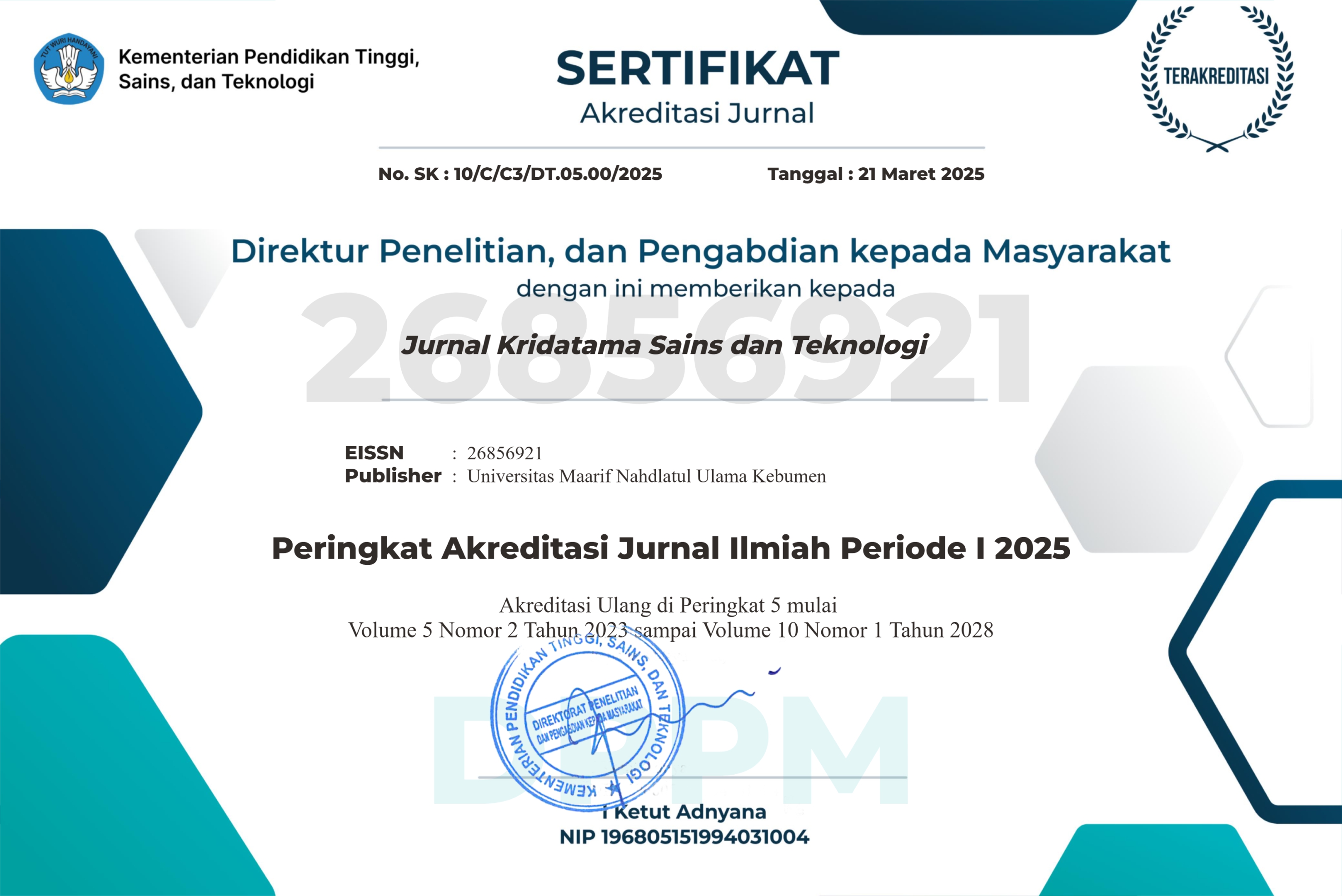Implikasi Kebijakan Otonomi Daerah terhadap Pengelolaan Lembaga Pendidikan Islam
DOI:
https://doi.org/10.53863/kst.v4i01.483Abstract
Madrasah performance dominantly to date is very low and below the standard of other educational institutions. Only a small number of Islamic education are able to compete with other educational institutions. Seeing such a phenomenon is interesting to conduct an assessment of the conditions and problems that are actually faced by Islamic education institutions in Indonesia. Research is a literature research with the focus of the study of the implications of regional autonomy policies in the management of Islamic educational institutions, while the object to be studied is the implications of the regional autonomy policy in the management of Islamic educational institutions, with the procedure for obtaining data on researchers using literature. The data obtained will be identified, examined, analyzed, and interpreted so that the substance of the implications of regional autonomy policies in the management of Islamic educational institutions can be captured. After that, researchers will try to compare with other theories, to achieve a complete picture of the implications of regional autonomy policies in the management of Islamic educational institutions. The results of the study that the presence of madrasas in Indonesia has the same duties and roles as schools. As an educational institution that prepares the young generation of Muslims for the future, madrassas are expected to be able to produce graduates who will be able to play an important role in all sectors of national life, both the religious, social, economic, political, scientific and technology sectors. Madrasas are seeded than public schools because madrasas provide religious education (which is better than public schools) in addition to public education (which is the same as public schools). The problem that is still faced by madrasas today is the still low quality standards of general education provided in madrasas. Problems in the management of Islamic educational institutions in Indonesia faced, are (1) management problems which include the field of human resources/education personnel, curriculum fields, facilities and infrastructure; (2) Conceptual-Teoritis and Operational-Practical Problems; and (3) the problem of education policies and politics.
Keywords: Implications, Regional Autonomy, Madrasa, Problems, Solutions
References
Bakar, Usman Abu dan Surohim, Fungsi Ganda Lembaga Pendidikan Islam, Respon Kreatif terhadap Undang-Undang Sisdiknas. Yogyakarta, Safiria Insania Press, 2005.
Caldwell, Brian J. School-based Management, International Encyclopedia of Education. Oxford: Pergamon, 1994.
. School Based Management. Paris: UNESCO, 2005.
Coombs, Philiip H. What is Educational Planning?. Paris: United Nations Educational, Scientific and Cultural Organization, 1970.
Daulay, Haidar Putra. Pendidikan Islam Dalam Sistem Pendidikan Nasional Di Indonesia. Jakarta: Kencana, 2004
Depag RI. Kebijakan Strategis Ditjen Kelembagaan Agama Islam Tahun 2003-2005. Jakarta: Ditjen Kelembagaan Agama Islarn Departemcn Agama RI, 2003.
Depdiknas RI. Manajemen Berbasis Sekolah. Jakarta: Program Guru Bantu - Direktorat Tenaga Kependidikan, 2003.
Fadjar, A. Malik. Madrasah dan Tantangan Modernitas. Bandung: Mizan, 1999.
. Reformasi Pendidikan Islam. Jakarta: Fajar Dunia, 1999.
Kinicki, Angelo & Williams, Brian K. Management: A Practical Introduction. New York: McGraw-Hill, 2003.
Mas'ud, Abdurrahman. Menggagas Formasi Pendidikan Nondikotomik: Humanisrne Religius sebagai Paradigma Pendidikan Islam. Yogyakarta: Gama Media, 2002.
Masyhuri AM, dkk. Problematika Madrasah. Jakarta: Dirjen Kelembagaan Agama Islam Depag RI., 2001.
Postman, Neil. The End of Education: Redfining The Value of School. New York: Alfred A Knopf, 1995.
Suhadi. Pemberdayaan Pendidikan Masyrakat. Jakarta : LA. 2003.
Suprayogo, Imam. Quo Vadis Madrasah: Gagasan, Aksi & Solusi Pembangunan Madrasah. Yogyakarta: Hikayat Publishing, 2007.
Thoha, Chabib dkk. Reformulasi Filsafat Pendidikan lslam. Yogyakarta: Pustaka Pelajar, 1996.
Tilaar, H.A.R. Paradigma Baru Pendidikan Nasional. Jakarta : Rineka Cipta, 2004.
Downloads
Published
How to Cite
Issue
Section
License
Copyright (c) 2022 Mugiarto,Iim Wasliman,Sri Handayani

This work is licensed under a Creative Commons Attribution-NonCommercial-NoDerivatives 4.0 International License.
Authors retain copyright and grant the journal right of first publication with the work simultaneously licensed under a Creative Commons Attribution-ShareAlike 4.0 International License that allows others to share the work with an acknowledgment of the work’s authorship and initial publication in this journal

















